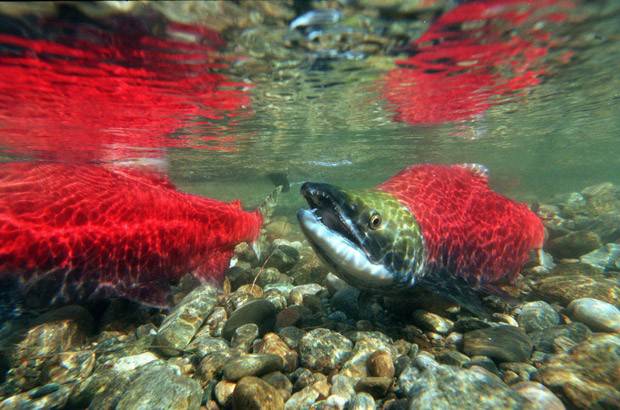The BC NDP government will give the province’s fish farms four years to secure the support of any local First Nations as well as a determination from the federal government that a farm does not endanger any wild salmon habitat, Global News has learned.

The new policy effectively gives some First Nations veto power over an entire industry.
While some First Nations support aquaculture operations, many do not.
Coverage of fish farms on Globalnews.ca:
Agriculture Minister Lana Popham, who has been under pressure from anti-fish farm activists to quickly shutter farming operations, will make the official announcement Wednesday.

Get daily National news
Instead of closing fish farms, Popham will announce that farm tenures will be renewed on a month-to-month basis, as was the case for a number of years. The new rules requiring First Nation consent take effect June 22, 2022.
This gives the NDP government discretionary authority over 20 contentious fish farms in the Broughton Archipelago off the north end of Vancouver Island. They will continue to operate for some time yet, but their continued existence is far from certain.
- ‘Something just went off’: Canadians in Middle East describe ‘surreal’ Iran missile strikes
- ‘At first I cried’: How Iranian Canadians are reacting to the U.S. strikes in Iran
- As Iran conflict spirals, there are 85K Canadians in Middle East, GAC says
- Carney and India’s Modi strike new energy partnership
READ MORE: B.C.’s wildlife tourism industry pushes for fish farm licences not to be renewed
It is also unclear what will happen if one particular First Nations supports a fish farm operation, while another opposes it. If First Nations have overlapping territory, the fate of the farm in question would likely be decided by the “strength of claim” each of them possesses.
In other words, it is likely some jurisdictional arguments may be resolved through legal action in court.
There is also uncertainty on just how the federal Department of Oceans and Fisheries will determine whether a fish farm operation poses a threat to wild salmon.
There is unresolved debate over whether fish farms are to blame for any decline in wild salmon numbers (there are opposing views even among some federal scientists).

Nevertheless, a controversy has raged for years about the serious decline over some salmon runs, and many fingers have been pointed at the fish farm industry for possibly transmitting diseases that could harm wild salmon.
The industry counters that those are claims are unproven.
The backdrop to the government’s decision to grant veto power to First Nations in this area is the BC NDP’s decision to fully embrace the United Nations Declaration on the Rights of Indigenous Peoples (UNDRIP), which stipulates that governments must give local Indigenous people “free, prior and informed consent” over resource development operations.
According to a federal fisheries report, there are 740 aquaculture operations in B.C. that employ about 6,000 people.
In 2010, the annual harvest was worth almost $600 million, making aquaculture the biggest component of B.C.’s agriculture industry.













Comments
Want to discuss? Please read our Commenting Policy first.